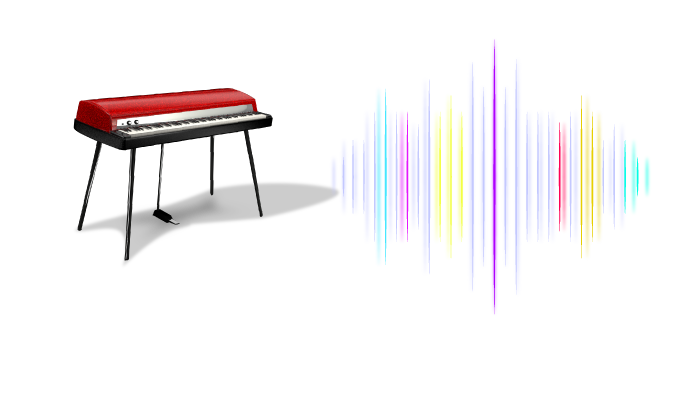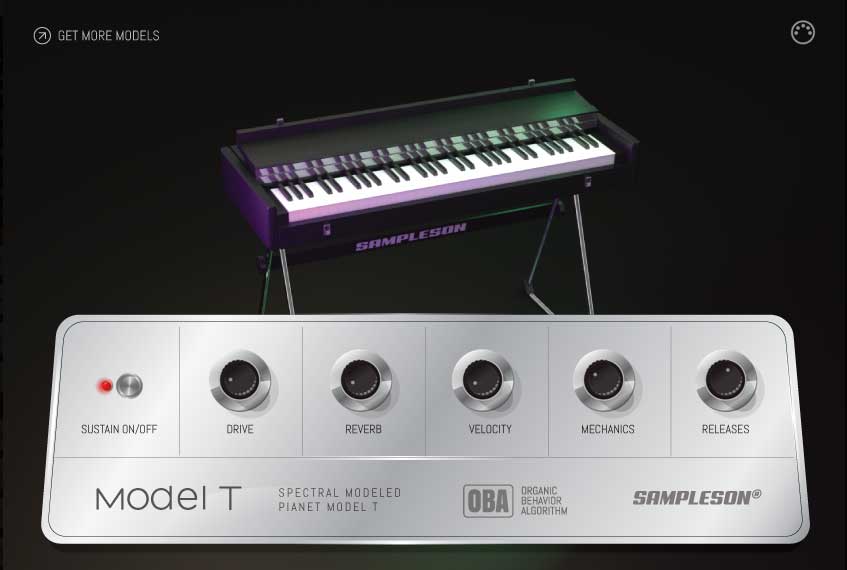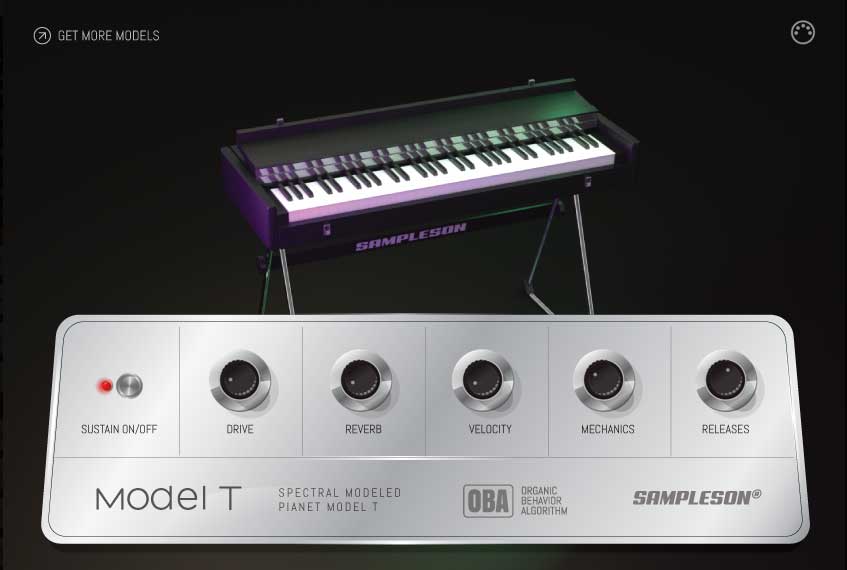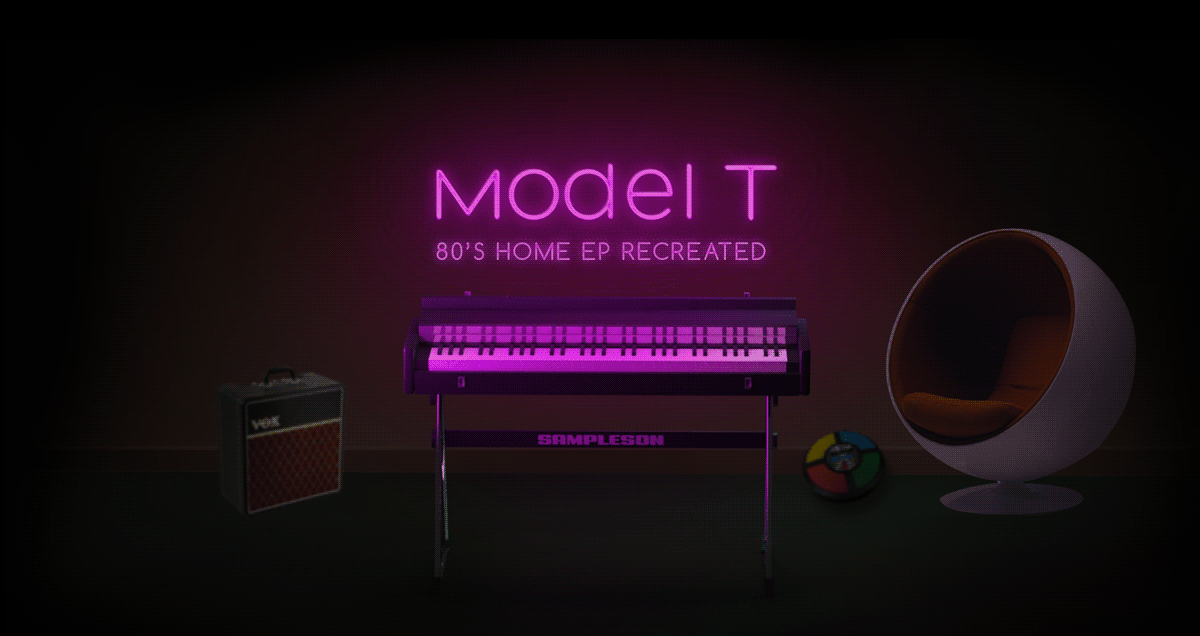Share
Sampleson Model T
Sampleson Model T
Couldn't load pickup availability
INTRODUCING MODEL T
Spectral Modeled '80s EP
A classic of the late '70s and '80s. We recreated a classic '80s EP by Spectral Modeling, offering the real sound and feel of the simplest electromechanical piano in the history in only 30 MB.
Carefully crafted. Detailed recreation of every single mechanical noise and main timbre. No velocity switching since is not sample-based. Available for Mac & Win, Standalone and Plug-in versions.
MODEL T SOUND DEMOS
This was one of the most affordable and common electromechanical pianos produced in the late '70s. Based on reeds, it generates a warm, bell-like but dark tone. It doesn't include a sustain pedal due to its simple mechanics and easily replaceable pieces, but we included the option to activate the sustain pedal on our modeled recreation.
We also recreated the mechanics sound, very present in every sound (controllable individually on our instrument).
AN '80S CLASSIC
In the late '70s, it was launched a simple but yet powerful electromechanical piano. Manufactured between 1977 and 1982, this classic electromechanical piano was one of the simplest EPs in history. Based on reeds and sticky pads, it offers a "Reed-Like" sound but with a much more present mechanical noise due to the proximity of the mechanics to the keyboard itself.
It doesn't offer a sustain pedal or volume/tone controls. Despite this, its tone makes it extremely effect-friendly, as many vintage EPs.
WHAT EXACTLY IS SPECTRAL MODELING?
Every sound in nature, from a bird tweet to a trumpet note, can be decomposed into simple sine waves. Spectral Modeling is the process of analyzing and creating a sound by stacking simple sine waves.
According to Julius O. Smith (Stanford), Spectral Modeling provides a sound representation much closer to the perception of sound by the brain because your ear and brain are, in fact, spectral decoders.
You can read more about Spectral Modeling here.

INTRODUCING MODEL T
Spectral Modeled '80s EP
A classic of the late '70s and '80s. We recreated a classic '80s EP by Spectral Modeling, offering the real sound and feel of the simplest electromechanical piano in the history in only 30 MB.
Carefully crafted. Detailed recreation of every single mechanical noise and main timbre. No velocity switching since is not sample-based. Available for Mac & Win, Standalone and Plug-in versions.
MODEL T SOUND DEMOS
This was one of the most affordable and common electromechanical pianos produced in the late '70s. Based on reeds, it generates a warm, bell-like but dark tone. It doesn't include a sustain pedal due to its simple mechanics and easily replaceable pieces, but we included the option to activate the sustain pedal on our modeled recreation.
We also recreated the mechanics sound, very present in every sound (controllable individually on our instrument).
SEE IT IN ACTION
AN '80S CLASSIC
In the late '70s, it was launched a simple but yet powerful electromechanical piano. Manufactured between 1977 and 1982, this classic electromechanical piano was one of the simplest EPs in history. Based on reeds and sticky pads, it offers a "Reed-Like" sound but with a much more present mechanical noise due to the proximity of the mechanics to the keyboard itself.
It doesn't offer a sustain pedal or volume/tone controls. Despite this, its tone makes it extremely effect-friendly, as many vintage EPs.
WHAT EXACTLY IS SPECTRAL MODELING?
Every sound in nature, from a bird tweet to a trumpet note, can be decomposed into simple sine waves. Spectral Modeling is the process of analyzing and creating a sound by stacking simple sine waves.
According to Julius O. Smith (Stanford), Spectral Modeling provides a sound representation much closer to the perception of sound by the brain because your ear and brain are, in fact, spectral decoders.
You can read more about Spectral Modeling here.
SYSTEM REQUIREMENTS
MacOS- Supported on Apple Silicon (Native) and Intel Macs.
- Standalone App, VST3 and AU included.
- Works on OSX 10.7 or later.
- Host must support VSTi or AU plugins.
- 100 MB HDD.
- 4GB RAM.
- 64 bits Plugin and Standalone.
- Standalone 64 bits App and VST3 included.
- Windows 7 or later.
- Host must support VSTi plugins.
- 100 MB HDD.
- 4GB RAM.
- 64 bits Plugin and Standalone.
Online activation required.




